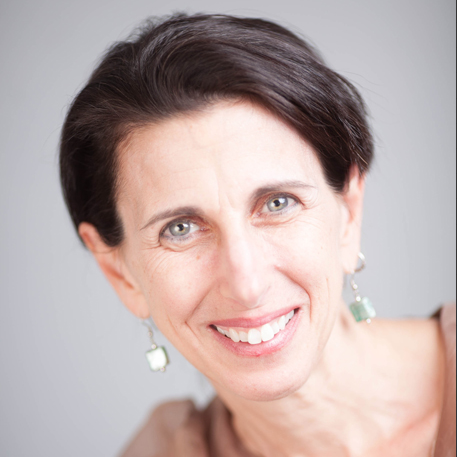Essay by Kim Triedman
Writing as Risk Taking
I was never that kid on the rollercoaster. As a child, even the Ferris wheel felt like a push, including as it did that stomach-lurching moment when you surmount the peak and drop headlong through the night's trap door. When my siblings made a beeline for the haunted house, my father stayed behind with me, dutifully tossing beanbags into holes for the promise of a pink stuffed poodle.
 It's possible I was born this way, with a furrowed brow and a high index of risk aversion. What I do remember about those early days is the way I withheld—the way I knew there were lines I shouldn't cross—as though something inside was always keeping an eye on what I could and couldn't handle. In school, I raised my hand only when I knew I had the right answer—6 x 6?; the capital of Utah?—and in college, I steered clear of anything creative, preferring the safety of science over nuance. I lived my life with one finger on my own pulse.
It's possible I was born this way, with a furrowed brow and a high index of risk aversion. What I do remember about those early days is the way I withheld—the way I knew there were lines I shouldn't cross—as though something inside was always keeping an eye on what I could and couldn't handle. In school, I raised my hand only when I knew I had the right answer—6 x 6?; the capital of Utah?—and in college, I steered clear of anything creative, preferring the safety of science over nuance. I lived my life with one finger on my own pulse.
This kind of self-insulation carries with it its own weight, like a cocoon that must ultimately be broken in order for something fully realized to emerge.
My life broke when I was 37 years old, sitting out on my front stoop one day while my kids played their make-believe games in the downstairs playroom. I called my husband and told him I couldn't breathe and found myself, two terrifying days later, on the receiving end of a prescription pad, wondering if and when I would ever get my life back.
It turns out that wasn't the question at all. I had no choice but to move forward, into this new place where the old one had dropped me. I suddenly found myself in a world that I'd never inhabited before, and I needed to find new legs and eyes with which to negotiate it. My mom, in her quiet wisdom, gave me the wings.
"Write it down," she told me. So I did.
During that strange and telescoped time, I filled simple college-ruled notebooks so fast my hands couldn't keep up with my words. It was an unprecedented kind of recklessness, unconstrained, but it tethered and calmed me in a way that nothing else could.
The writing allowed me to take risks—a critical touchstone in my healing—and the more I wrote, the more I seemed to have to say. It became a way of processing my world.
In the years since, I've discovered just what stories I have to tell. When I begin a poem, with a phrase or an image, I rarely know where it's going to lead. The whole process of believing in the process, of closing my eyes and careening down the words without a safety net, is what gives the poem its lift. Only through this kind of letting go do I discover where I need to end up: the very last line, like an answer to a problem.
My novel began with a voice, not an idea. One cold winter night, sleep-thick and bleary, I followed it up to my third-floor office. I had just started reading Barbara Kingsolver's Poisonwood Bible (which begins with its own incredible seduction: "Imagine a ruin so strange it must never have happened"), and I fell asleep with that dark and disembodied voice in my head.
That night, I wrote a few pages, a scene of sorts, but I had no idea what it was or where it was coming from. This continued for many nights, waking and writing, the gradual accretion of scenes with no real context. At some point, I looked at what I'd accumulated and realized I was writing a story in fragments, with no discernible scaffolding, from the voice of what was to become the novel's main character. It was telling itself to me, on its own timetable and in its own way, but it was a slow reveal: I needed to write it in order to understand why I needed to write it.
 What I learned over the years to come was that the story I was telling was a story of voice—of losing one and finding one—and of the deep emotional strictures that can keep people from fully inhabiting their own. In my younger years, the more layers of protection I laid down, the more something inside had bucked and reared and clamored to get out.
What I learned over the years to come was that the story I was telling was a story of voice—of losing one and finding one—and of the deep emotional strictures that can keep people from fully inhabiting their own. In my younger years, the more layers of protection I laid down, the more something inside had bucked and reared and clamored to get out.
In the end, my breaking open, as I like to think of it, was an unmitigated blessing. I started receiving my world in quieter and subtler ways, examining it, relishing the experience of not knowing what was coming next. It became a wider and more colorful place, and I took pains to capture it in words, precisely, as though the very act of pinning it down became its own greatest reward.
I came to love my forties. I woke up most days humming with purpose and questions and words buzzing around my head. I finished both my novel and three collections of poetry in a ridiculously short period of time, as though something inside was bursting at the seams with all it had been meaning to say.
These days, I still find myself balking at certain things. When I recently saw photographs of my brother bungie jumping in New Zealand, I knew that wasn't in my future. Ditto for the next Quentin Tarantino movie. I'm not so carefree as to relinquish all personal and emotional safeguards, but I am living a life that feels much more what it was meant to be. I'm following its lead, its own messy logic, because I know that it brings me where I need to be. And I'm not settling for that pink poodle anymore. I've got my eyes on the flying trapeze, high overhead.
Art Information
- From the blog Lost in Arles © Heather Robinson; used with permission.
 Kim Triedman is both an award-winning poet and novelist. Her debut novel The Other Room, a finalist for the 2008 James Jones First Novel Award, will be released this October. Her two new poetry collections—Plum(b) (Main Street Rag Press) and Hadestown (WordTech Communications)—were also published in 2013.
Kim Triedman is both an award-winning poet and novelist. Her debut novel The Other Room, a finalist for the 2008 James Jones First Novel Award, will be released this October. Her two new poetry collections—Plum(b) (Main Street Rag Press) and Hadestown (WordTech Communications)—were also published in 2013.
Kim's work has appeared in numerous anthologies and literary journals, including Prairie Schooner, WomenArts Quarterly, Cognoscenti, and Salamander. Following the 2010 earthquake in Haiti, she developed and edited Poets for Haiti: An Anthology of Poetry and Art, which benefited Paul Farmer's Partners In Health.
When Kim is not writing, she spends her time thinking about flying and not doing housework.
